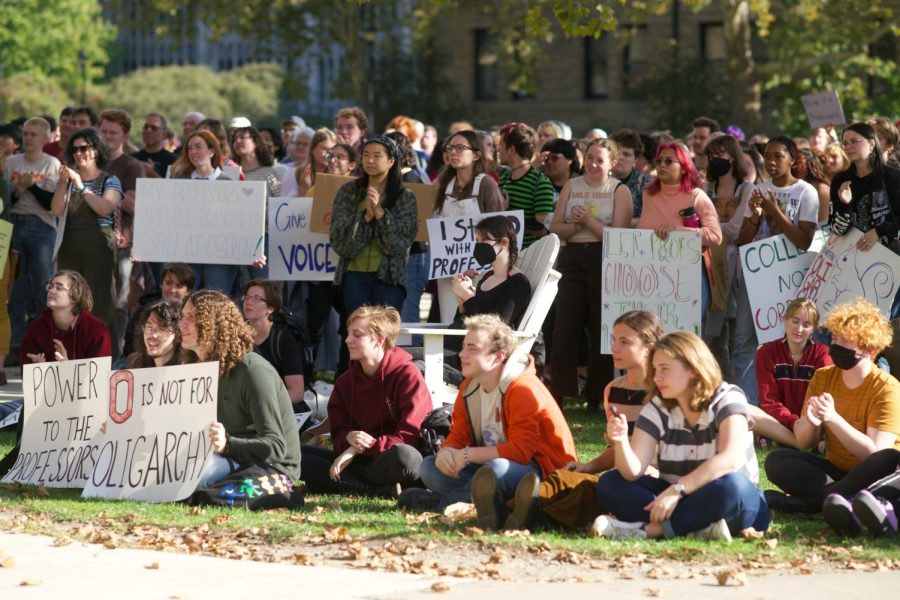Oberlin’s School Spirit Dependent on Dissent
Students’ criticisms of the College indicate an enduring school spirit.
A previous Review article makes reference to Oberlin students’ “knowledge and understanding of our institution’s imperfections” as a complicating factor — and even a hindrance — to their feelings of school spirit (“Oberlin School Spirit Complicated by Communal Faults, Uplifted by Intentional Celebration of Success,” The Oberlin Review, March 10, 2023). I, respectfully, disagree.
My disagreement does not pertain to the entirety of the article. In fact, I agree with its primary argument in favor of institutional pride. I agree that the seemingly overwhelmingly negative attitude of Oberlin’s student body should not overshadow our acknowledgement and celebration of the school’s achievements, and I agree, too, that our awareness of the institution’s faults should not prevent us from appreciating its progressive spirit.
But the article seems to posit that students’ critiques of the College and their feelings of pride are inherently contradictory. While it concedes that the two might exist simultaneously, the suggestion is still that our negativity takes away from the fervor of whatever level of school spirit we might have otherwise had. I do not think that these qualities are mutually exclusive. I see our refusal to ignore our institution’s faults as integral to the very progressivism that the Editorial Board asserts we should be celebrating. Our progressive spirit finds its base in an impulse and desire for social change, and critique — of our institution or otherwise — is critical to its enactment.
How can we improve our institution or change the world if we don’t identify areas, such as Oberlin’s treatment of its employees or its misguided fiscal ventures, in which such change should take place? And if a student’s frequent engagement in critique and protest of the College’s policies is for the purpose of bettering their institution, how can it be said to detract from their school spirit?
As an Opinions columnist, I frequently level my own criticisms against the College. I don’t write negative articles because I lack school spirit; I do so because I care about the institution that I chose to be my home for four years.
One of the articleʼs proposals for how we might improve our school spirit was to remember the reasons why we chose to attend Oberlin in the first place, “whether we came [here] because of its progressive spirit, impressive music, study abroad opportunities or international reputation.” Oberlin’s uniquely progressive spirit — embodied by, among other things, its history of student activism and faculty engagement from its inception — is one of the primary reasons I chose the institution and one of the characteristics by which I feel that Oberlin is distinguished from other schools.
For example, when faculty and students gathered earlier this academic year to protest amendments to the bylaws that previously gave faculty their unique position of governance over the institution, they did so to protect the College from a policy that was abhorrent to Oberlin’s history and that would eventually be implemented by a branch — the Board of Trustees — extrinsic to its campus culture. I hope to — and am inspired by other students’ attempts to — hold the school accountable to the progressive ideals of social justice and academic exploration that drew me here.
I consider our frequent critiques — and, yes, negativity — to be a manifestation of our unique school character and a celebration of its own kind: weird, yes, and certainly overzealous at times, but can’t the same be said of the pep rallies and relentless merchandising that take place at the other institutions that the Editorial Board suggests we should mimic — and which do take place, if to a lesser extent, on our own campus as well?
Personally, I would like to opt out of the “broadly supportive spirit” that the Editorial Board identifies in other student bodies “toward the efforts and investments of their institution.” This is not because I think that the efforts and investments made by Oberlin College are so horrible as to preclude my support for the institution itself. While Oberlin’s recent indiscretions, such as the Gibson’s trial or the low wages paid to its employees, might be especially problematic, I do not believe that Oberlin is unique in its flaws.
I sincerely doubt that any institution is perfect, and I suspect that “broad” support, without qualms or critique, for the acts of any imperfect institution might be better characterized as blind. I agree with the Editorial Board that students should feel pride for their institution where it is due, and I appreciate its concession that we might do so at the same time as we criticize Oberlin’s faults. I encourage Oberlin students, however, to see their criticisms not as a detractor from our support for the College but as an expression of support in and of itself. I see no better way to express my pride in my institution than by seeking to advance its best qualities through both affirmation and dissent.


